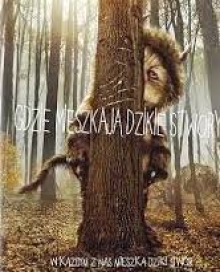Is „Where the wild things are” a film directed to children?
Czy „Gdzie mieszkają dzikie stwory” jest filmem dla dzieci?
René Revilla, tłumaczenie: Patryk Tomczuk
Studenci Instytutu Filologii Angielskiej Uniwersytetu Wrocławskiego (pod kierunkiem dr Justyny Deszcz-Tryhubczak)
Spike Jonze´s Where the Wild Things Are cannot be considered to be a film directed to children since its main topics or motifs cannot be understood by a child. This masterpiece is directed to a more adult audience since its overall sense is likely to be unclear to child viewers. It goes beyond the sheer amusement and the impact that cartoons and visual effects have on children. As a matter of fact, the film is actually an exploration of childhood and a reflection of humans’ lack of control over their lives and their emotions.
Where the Wild Things Are digs into the notion of loneliness by means of focusing on Max, a pretty active and imaginative child who lives in a dysfunctional family. His mother’s emotional situation, along with his sister’s passivity towards him, makes Max become an isolated child within a world that he barely understands. Moreover, he is definitely out of control and unaware of how to face the different situations that he deals with throughout the film. In fact, the boy is unable to decide whether to be happy or to be sad and reacts according to the events that come about in his life. Max is not even able to manage these situations because they come to him unexpectedly. He reacts to them with his instinctive wild side since he does not have adult rationality. He is able to self-destruct; moving from joy to hatred or sadness with an astonishing ease, perfectly representing the extremely thin line that divides pure happiness and the deepest drama. Notwithstanding, his misbehavior does not seem to be only his fault, but, on the contrary, it may have been caused by the lack of a parental role model in his life, along with the chaos that reigns in his home. This is how he perceives his predicament:
Mom: Max, what’s wrong with you? You are out of control!
Max: It’s not my fault!
Ultimately, Max appears to us as the perfect vehicle by means of which the director Spike Jonze represents our struggle against our most powerful enemy: ourselves. A perfect representation of the human fight against all the distresses that invade people’s thoughts. It is a struggle against all those “monsters” dwelling in everyone’s mind. These monsters are nothing else but the embodiment of doubts, dreams, and fears.
In conclusion, the film’s actual intention is to show the continuous fight we must face up to against our own emotions in order to reach happiness. This fight is only over once we have already completely acknowledged and controlled all the inner monsters, which is perfectly reflected at the very end of the film. Max leaves the island once he has acknowledged and defeated his inner worries and decides to rush home in order to meet his mother again. In the course of this stunning journey he finds not only the release of his psychological instability but also the way towards an early and promising maturity. Spike Jonze gifts us with a story to which we cannot remain indifferent: the monsters are nothing but a characterization of everyone of us. This is a depiction of the human condition.
Gdzie mieszkają dzikie stwory Spike’a Jonze’a nie może zostać uznany za film skierowany do młodszego widza, gdyż tematy i wątki, jakie porusza, mogłyby nie zostać w pełni zrozumiane przez dziecko. To arcydzieło wycelowane jest w bardziej dojrzałego widza, który nie zniechęci się zawiłościami pewnych motywów, które mali odbiorcy uznaliby za niejasne. Film stanowczo wykracza poza ramy czysto rozrywkowego widowiska, napakowanego bajkowością i efektami wizualnymi. W rzeczywistości jest on eksploracją dzieciństwa, ukazującą ludzkie trudności i walkę z emocjami.
Skupiając się na postaci Maxa, Gdzie mieszkają dzikie stwory bierze pod lupę temat samotności. Max jest bardzo aktywnym i kreatywnym dzieckiem, żyjącym w rodzinie, którą nękają problemy. Skomplikowane relacje jego mamy z mężczyznami, jak i pasywne zachowanie siostry wobec niego, sprawiają, że Max staje się wyalienowanym dzieckiem w świecie, który ledwie rozumie. Co więcej, jest on nieświadomy swych własnych rozterek i nie zdaje sobie sprawy z własnej niewiedzy, jak radzić sobie w różnych sytuacjach. W gruncie rzeczy sam Max nie wie, czy być szczęśliwym, czy smutnym, reagując pod wpływem emocji i nie mogąc w żaden sposób zapanować nad danymi uwarunkowaniami. Nie wykazuje on żadnego racjonalizmu, odnosząc się do rzeczywistości, jaka go spotyka, w gwałtowny i bezkompromisowy sposób. Jest w stanie dokonać samozniszczenia; z łatwością przeskakując od szczęścia, przez smutek, do nienawiści. Cienka jest granica pomiędzy całkowitym błogostanem, a najgorszą tragedią w życiu Maxa. Niemniej ciężko jest się doszukiwać winy tylko po jego stronie. Brak odpowiedniego autorytetu i chaos panujący w jego domu stanowczo mogły się przyczynić do zaistniałej sytuacji. W taki oto sposób Max reaguje na zarzut swojej mamy względem jego zachowania:
Mama: Max, co się z Tobą dzieje? Kompletnie Ci odbija!
Max: To nie jest moja wina!
Poprzez bezbłędną kreację postaci Maxa Spike Jonze prezentuje publiczności zmagania z naszym najgroźniejszym wrogiem: nami samymi. Fenomenalna manifestacja ludzkiego konfliktu przeciwko cierpieniu ogarniającemu umysły, jak i starcie z tym wszystkim „dzikimi stworami”, które zamieszkują nasze głowy, nie jest niczym innym, jak tylko symbolem wątpliwości, marzeń i grozy.
Konkludując, faktycznym założeniem filmu było przedstawienie nieustającej walki jaką toczymy z własnymi emocjami, by osiągnąć radość. Ta walka się zakończy dopiero wtedy, kiedy zaakceptujemy i zlikwidujemy nasze wszystkie wewnętrzne demony, co zostało celnie zobrazowane w filmie. Max opuścił wyspę w momencie, kiedy zrozumiał i pokonał swoje własne ograniczenia i czym prędzej wyruszył do domu, by zobaczyć się znowu z mamą. Podczas swojej fantastycznej podróży znajduje nie tylko możliwość wyrzucenia z siebie wszelkich negatywnych emocji, ale także drogę w kierunku wcześniejszej i obiecującej dojrzałości. Spike Jonze przybliża nam historię, której nie możemy zignorować: stwory są niczym innym, jak tylko odzwierciedleniem każdego z nas. Taki jest obraz ludzkiej natury.

